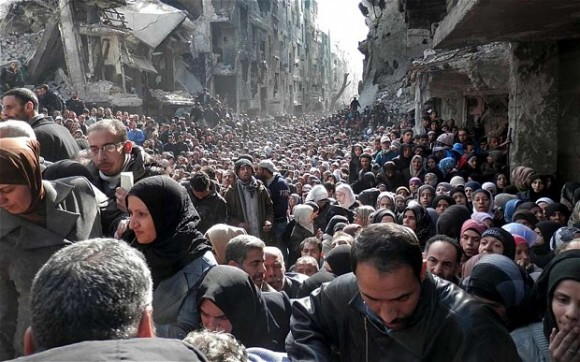
Before it was a refugee camp, Al-Yarmuk was long known as the battle that consolidated Syria under Arab rule after the landmark defeat of the Byzantine Empire in 636 C.E. From now on, however, it will symbolize a different event.
Al-Yarmuk now stands between Tel Al-Za’tar – the Palestinian refugee camp in Beirut that was besieged and then assaulted by Syrian-backed, right-wing Lebanese militias in 1976 – and the next barrel bomb attack on Palestinian communities in Syria, who are today scavenging in desperation to stay alive. They are waiting for an increasingly elusive settlement between the regime, Palestinian groups, and Free Syrian Army (FSA) factions. In an eerie echo of the Palestinian-Israeli peace talks, the deal will not come soon.
Like other Syrians, Syrian Palestinians are collateral damage to both the Syrian regime’s bombing and the international approach that chooses to manage the disintegration of Syria. This is unlikely to change any time soon given the United States’ evolving policy of containment toward Russia in the wake of the crisis in the Ukraine and its unsurprising failure to broker an Israeli-Palestinian agreement – unsurprising because of US unwillingness or inability to pressure Israel into ceding control of the occupied territories.
This May, in commemorating the 66th anniversary of the Nakba (the catastrophe, as Palestinians term their expulsion from their homeland and the resultant creation of Israel), it seems we are rather re-living it; Palestinians grow richer only in their experience of defeat and fragmentation. It is an experience shared today with Syrians, and yesterday with Iraqis, yet Palestinians remain at the bottom of the growing pile of crises and the growing numbers of refugees.
The crisis of Al-Yarmuk has unearthed trans-generational memories of the 1948 Nakba, kept alive by the obduracy of second- and third-generation refugees now witnessing their camps – their neighborhoods – disappear like those of their grandparents.
In the midst of this, we must come to grapple with the historical position of the Syrian Arab Republic as a champion of Palestinian rights. What did it mean, where are we left, and who remains to champion the right of return?
De jure, Palestinians are well integrated into the Syrian legal system and treated as equals. Most of their rights are a legacy predating the Baath regime, dating back to 1956 parliamentary amendments. Others are a Nasserite inheritance from when Syria was in the United Arab Republic with Egypt. Palestinian rights in Syria are thus the paternalistic relic of a time when Arab countries were the self-appointed custodians of the Palestinian fate as perpetual refugees, lest they forget their land or their cause.
Even though Syria “championed” the Palestinian cause, Palestinian Syrians were not allowed to be fully Palestinian – nor fully Syrian. The much-touted policy of full integration and fair treatment overlooked the question: integrated into what?
Syrian Palestinians were fully integrated into a totalitarian system that divided by force its own Syrian population from any meaningful right to free political expression. It managed to keep self-determination at bay through the combination of a ruthless security apparatus and economic policies securing minimum living standards for the ruled population.
So, full integration equaled full cooptation and the systemic subversion of the emergence of strong institutional expressions of a distinct Palestinian national identity. And although many Syrian Palestinians continue to express their ties to their ancestral lands in Palestine from the shelter of their camps, they have never been allowed to set foot there, and cannot organize efforts to secure a return.
One of the accomplishments of the Syrian uprising is that it has extended the right –for all those in Syria including Palestinians – to return to politics. Communal suffering under violence has led to the realization of both Palestinian and Syrian ideals and identities away from the rhetoric of the regime.
With the regime in tatters and Palestinians used as scapegoats in a mired standoff with Palestinian factions and various FSA bodies besieging Al-Yarmuk, where does that leave Syrian Palestinians today?
While Syrian refugees flow into neighboring Turkey, Jordan, Lebanon, and further afield, Syrian Palestinians are filing into already over-crowded and under-serviced camps in Lebanon, while Jordan denies them entry. The Palestinian Authority has offered no meaningful help.
International efforts continue to provide relief and to seek an end to violence in Syria so as to allow Syrian refugees to return home. Syrian Palestinians will enjoy no such return. Israel continues to deny Palestinians access to their homeland, even while most of the newly displaced hail from the towns and cities of the Galilee that could be reached in a matter of hours if there were political will in the Knesset and the White House. Instead, like their grandparents in Jaffa 1948, and parents in Beirut 1982, Palestinians today return to the unknown on a path that may only lead to the next chapter of their interminable Nakba.


OMFG! What an overwhelmingly heartbreaking photo. I couldn’t bear to read past the second paragraph. Too much. I feel so damn insignificant right now. Sorry.
This conflict HAS to end. As do all its closely associated “little” wars. Though as the photo shows, there is nothing “little” about what’s happening in Syria, or more pointedly, to Palestinians in Syria.
Better days…